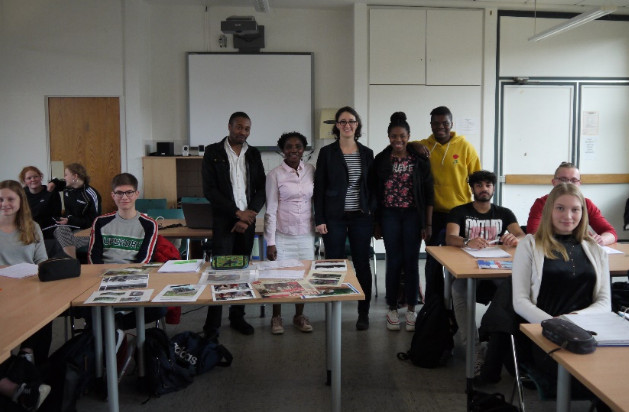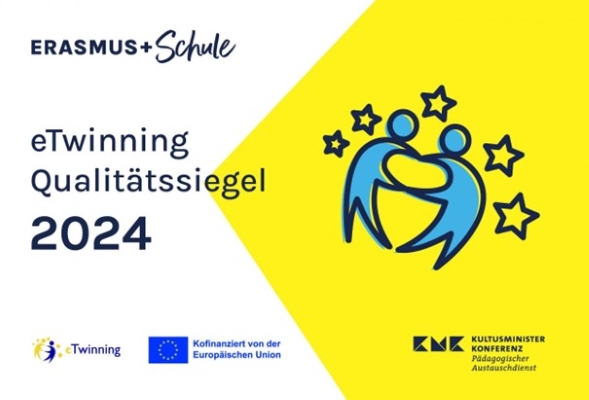“Nobody will take care of you if you are not able to pay enough money.”
That is a statement by Felicia Odum, who visited the advanced English courses at our school on the 3rd of February, 2020 together with her son Cliff and her daughter Mercy and Samuel, a young Nigerian man. They told us interesting and partly shocking facts and stories about Nigeria, and we could ask them whatever we wanted to know about their culture, Nigerian politics and everything that we have learned about the country so far. Our guests could perfectly answer our questions since they all have a Nigerian background, Felicia and Samuel were even born there.
Among all the information we received about Nigeria, one aspect seems to influence most parts of society: money. We got to know that corruption is a huge topic in Nigeria. The more you pay, the better your chances in many parts of life are, no matter if it affects your treatment in hospitals or your school education.
Felicia told us a shocking story that took place when she was in a Nigerian hospital: the people were crying and suffering from pain, even screaming but the doctors did not help them because the patients were not able to afford the medical treatment. After she had told us that they had even died because nobody took care of them, we realized that money plays an important role and actually determines how well your life is and even how long it might last.
Corruption influences the politicians as well and they are highly rich. But this money does not help the poor people but remains with the politicians themselves. Our visitors explained that you are not allowed to talk in a bad way about Nigeria’s politics because if you did, you could get killed. Besides that, we got to know that the LGBTQ community is oppressed by the government since it is not allowed to have a same-sex relationship in Nigeria.
Furthermore, Samuel described the religious situation in Nigeria. There are several religious groups like Christians and Muslims, but they do not get along very well and fight against each other.
In addition to that we got an insight into the cultural aspects of Nigeria: typical native food is the “fufu” which is comparable to the German mashed potato. Besides that, they eat a lot of English food because of colonialism when Nigeria was under British rule until 1960. Therefore, the English culture influences the Nigerian one even nowadays.
We asked our visitors what they think about the Germans. Samuel said: “They are okay, in their own way” which made us laugh because we know that Germans are said to be all negative and strict. Mercy pointed out that Nigerians are happier than Germans, for example at funerals. In Nigeria a funeral is like a celebration with friends from all over the country and a lot of drinking and eating. Nevertheless, they like Germany because Samuel told us that he got help here when he needed it. He moved to Germany five years ago, after he had to leave Nigeria because of the poverty he faced there. He wanted to help his family and went abroad to work in different companies until he came to Germany.
Felicia came for medical treatment but wanted to improve the situation in her home country even though she does not live there anymore. So, she started building an orphanage for homeless children which celebrates its ten years anniversary this year. She stressed that they started building the house “from zero” but have helped many children since then and gave them the opportunity to succeed in life.
We were very delighted to welcome our visitors in class and got a really interesting and probably the most authentic insight into the Nigerian life. At last, they insisted on telling us one more thing “Despite all these rather negative aspects that you got to know now, remember that Nigeria is actually a good country!”
Written by Marie Werning (Q1)Visitors from Nigeria
On the 3rd of February in 2020, a Nigerian family consisting of a mother, her two children and another Nigerian arranged to visit our two advanced English classes in order to grant insight into their homeland.
With great attention all the students listened carefully and were able to ask questions they were interested in.
It began with an emotional presentation of Felicia, the mother, depicting the poor living conditions in Nigeria and the project she established as a consequence. The project is supposed to support children by offering them a safe shelter and education, so they have a chance to live a fulfilled life. After that all of them told about the religious, cultural and political situation in Nigeria. They described it as a very intolerant country as the different religions, mostly Christians and Muslims, keep on drifting away from each other.
Moreover, they stated that the political system is one of the main problems Nigeria has to face as most politicians keep the money to themselves resulting into increasing poverty which is why the Nigerian population is forced to tackle the challenges themselves.
After they finished their presentation, the students responded with thunderous applause and left the room with a broad perspective of Nigeria.
Written by Ole Hautmann and Paul-Luis Müller (Q1)








